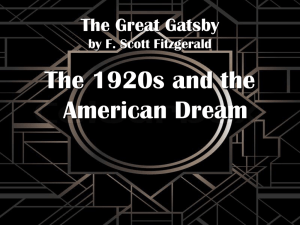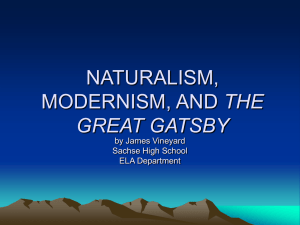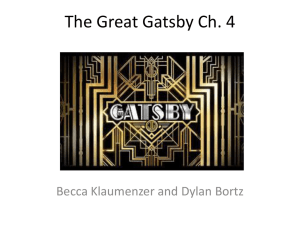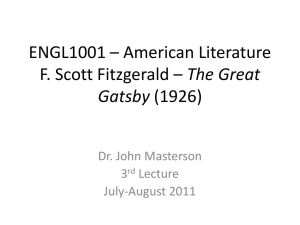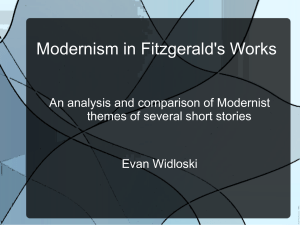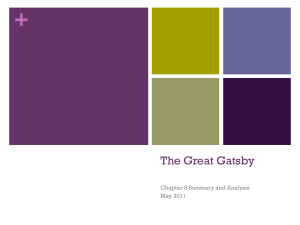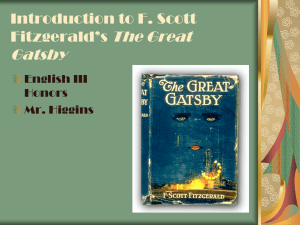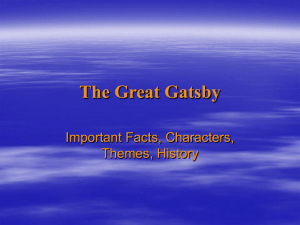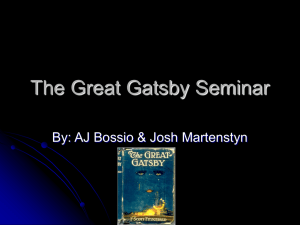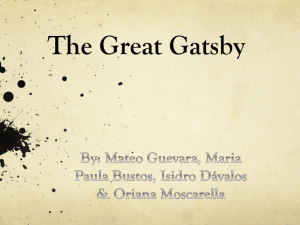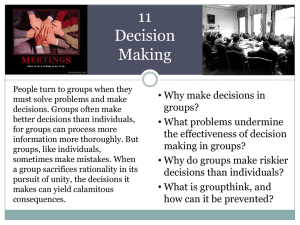American Literature – Gatsby – 4th Lecture Presentation
advertisement
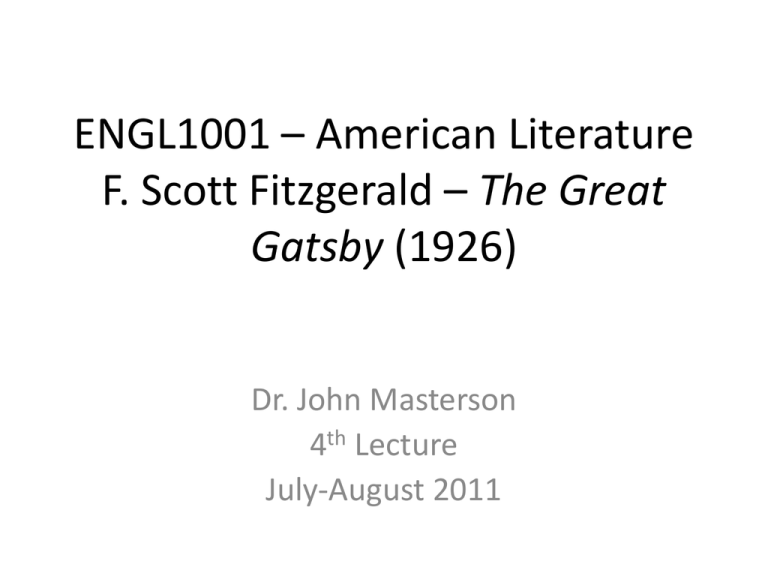
ENGL1001 – American Literature F. Scott Fitzgerald – The Great Gatsby (1926) Dr. John Masterson 4th Lecture July-August 2011 You can access these presentations through the ENGL1 blog •Go to – http://witsenglishi. wordpress.com Lionel Trilling, ‘F. Scott Fitzgerald’ (1945) • “Gatsby is said by some to be not quite credible, but the question of any literal credibility he may or may not have becomes trivial before the large significance he implies. For Gatsby, divided between power and dream, comes inevitably to stand for America itself. Ours is the only nation that prides itself upon a dream and gives its name to one, “the American dream.” Marius Bewley, ‘Scott Fitzgerald’s Criticism of America’ (1954) • “The Great Gatsby embodies a criticism of American experience ... The theme of Gatsby is the withering of the American dream ... The Great Gatsby is an exploration of the American dream as it exists in a corrupt period, and it is an attempt to determine that concealed boundary that divides the reality from the illusions. The illusions seem more real than the reality itself.” Nick on Gatsby. The Great Gatsby, Chapters 1 and 8 • Nick on Gatsby - “[He] represented everything for which I have an unaffected scorn.” Chapter 1 • “ 'They're a rotten crowd ... You're worth the whole damn bunch of them put together.'” Chapter 8 • “I've always been glad I said that. It was the only compliment I ever gave him, because I disapproved of him from beginning to end.” Chapter 8 Marius Bewley, ‘Scott Fitzgerald’s Criticism of America’ (1954) • “The Great Gatsby embodies a criticism of American experience ... The theme of Gatsby is the withering of the American dream ... The Great Gatsby is an exploration of the American dream as it exists in a corrupt period, and it is an attempt to determine that concealed boundary that divides the reality from the illusions. The illusions seem more real than the reality itself.” The Great Gatsby, p.8. • “No – Gatsby turned out all right at the end; it is what preyed on Gatsby, what foul dust floated in the wake of his dreams that temporarily closed out my interest in the abortive sorrows and short-winded elations of men.” Inventing and Re-Inventing the Self in American Literature See the Outline of Gatz’s Schedule in Chapter 9 of The Great Gatsby • “Rise from bed ……… 6am … • Study electricity, etc ….. 7.15-8.15 ….. • Practice elocution, poise and how to attain it ….. 5.00-6.00 pm • Study needed inventions ………. 7.00-9.00 • General Resolves …. • Read one improving book or magazine per week …” John Aldridge, ‘Fitzgerald: The Horror and the Vision of Paradise’ (1951) • “Gatsby’s story is, in a sense, Fitzgerald’s parody of the Great American Success Dream. Gatsby, surrounded by the tinsel splendor of his parties, dressed in his absurd pink suits, protected from social ostracism by the fabulous legend he has constructed around himself, is still the naively ambitious boy who wrote in that schedule of childhood the formula of success – “Rise from bed … Study electricity … Work … Practice elocution, poise and how to attain it … Study needed inventions.” The purchase of love and happiness is part of that formula … But it was his misfortune to have believed too strenuously and loved too blindly.” Image of Early European Settlers in America approx. 1610 See the Outline of Gatz’s Schedule in Chapter 9 of The Great Gatsby • “Rise from bed ……… 6am … • Study electricity, etc ….. 7.15.8.15 ….. • Practice elocution, poise and how to attain it ….. 5.00-6.00 pm • Study needed inventions ………. 7.00-9.00 • General Resolves …. • Read one improving book or magazine per week …” An Image of Tom Buchanan, Jordan Baker, Daisy Buchanan, Nick Carraway (behind Daisy) and Jay Gatsby from the 1974 film version of The Great Gatsby An Image of New York City in the 1920s The Great Gatsby, Chapter 1 • Nick - 'I told him. And as I walked on I was lonely no longer. I was a guide, a pathfinder, an original settler.' The Gatsby Style and the Possibility of Romantic Wonder Arthur Mizener • “Until very near the end of his life Fitzgerald felt that life was UNENDURABLE without a belief in realizing some romantic dream of a meaningful existence. In a letter to a friend about Gatsby he said that “the whole burden of this novel is the loss of those illusions that give such color to the world so that you don’t care whether things are true or false so long as they partake of the magical glory.” That is why, when Daisy destroys Gatsby’s faith and his dream at last breaks up, he finds himself in a “new world, material without being real,” and, in effect, chooses to die.” The Great Gatsby, Chapter 6 • “[Daisy's] glance left me and sought the lighted top of the steps, where 'Three o'clock in the Morning,' a neat, sad little waltz of that year, was drifting out the open door. After all, in the very casualness of Gatsby's party there were romantic possibilities totally absent from her world.” Malcolm Cowley, ‘Third Act and Epilogue’ (1945) • “More than any other writer of these times, Fitzgerald had the sense of living in history. He tried hard to catch the color of every passing year: its distinctive slang, its dance steps, its songs (he kept making lists of them in his notebooks), its favourite quarterbacks, and the sort of clothes and emotions its people wore.” The Great Gatsby, Chapter 6 • “[Daisy's] glance left me and sought the lighted top of the steps, where 'Three o'clock in the Morning,' a neat, sad little waltz of that year, was drifting out the open door. After all, in the very casualness of Gatsby's party there were romantic possibilities totally absent from her world.” The Great Gatsby, Chapter 8 • “She was feeling the pressure of the world outside, and she wanted to see him and feel his presence beside her and be reassured that she was doing the right thing after all.” • “For Daisy was young and her artificial world was redolent of orchids and pleasant, cheerful snobbery and orchestras which set the rhythm of the year, summing up the sadness and suggestiveness of life in new tunes.” Consider the motif of debt, credit, settling outstanding bills, paying the price, incurring various costs over the course of the text The Great Gatsby, Chapter 8 • “I have an idea that Gatsby himself didn’t believe [the phone-call] would come, and perhaps he no longer cared. If that was true he must have felt that he had lost the old warm world, PAID A HIGH PRICE FOR LIVING TOO LONG WITH A SINGLE DREAM. He must have looked up at an unfamiliar sky through frightening leaves and shivered as he found what a grotesque thing a rose is and how raw the sunlight was upon the scarcely created grass. A new world, MATERIAL WITHOUT BEING REAL, where poor ghosts, breathing dreams like air drifted fortuitously about … like that ashen, fantastic figure gliding toward him through the amorphous trees.” The Great Gatsby, Chapter 6 • “He talked a lot about the past, and I gathered that he wanted to recover something, some idea of himself perhaps, that had gone into loving Daisy. His life had been confused and disordered since then, but if he could once return to a certain starting place and go over it all slowly, he could find out what that thing was ...” The Great Gatsby, Chapter 5 • “There must have been moments even that afternoon when Daisy tumbled short of his dreams – not through her own fault, but because of the colossal vitality of his illusion. It had gone beyond her, beyond everything. He had thrown himself into it with a creative passion, adding to it all the time, decking it out with every bright feather that drifted his way. No amount of fire or freshness can challenge what a man can store up in his ghostly heart.” Whose American Dream?
